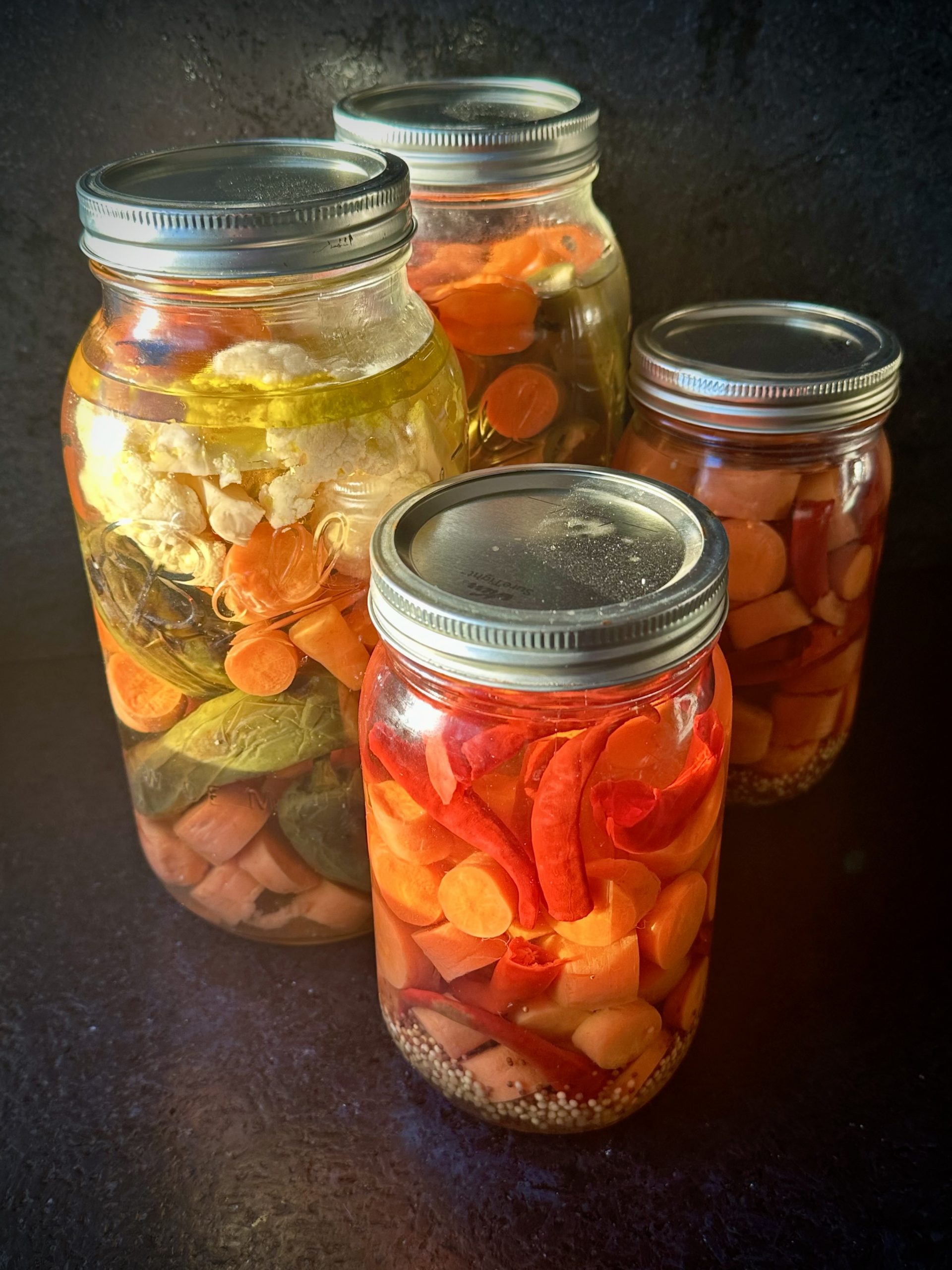“Are there carrots?” asked my friend.
The question was not existential. He was coordinating many meals, and wanted to ensure a supply of proper condiments. “Carrots” means pickled carrots and peppers, packed in quart jars with a sweet and salty vinegar. Once upon a time, these spicy, crunchy pickles had served as a currency amongst a certain circle of friends who believed that to properly feast, a jar of carrots must be on the table. In those days I would make about 30 quarts per year, for gifting, for swapping and for the table, where we enhanced our food, mid-chew, with the spicy, sour, salty sweet of pickled carrots and peppers. The meal planner had asked me if there were carrots so that we could properly feast at the work party planned in three weeks’ time. I had none, but promised to make a few jars.
I had never pickled carrots in winter before, only late summer, when the peppers are fresh and abundant. I use fleshy peppers like jalapeño or cherry bomb or Louisiana, but almost any pepper will work. When I went to the winter farmers market to pick up some freshly dug carrots I found a bag of dried, skinny, thin-skinned Thai peppers, and decided to give them a shot.
I knew those Thai chiles would reconstitute chewy, and possibly deadly. But I couldn’t resist making a few jars of totally local, spicy winter pickled carrots.
For old times’ sake, I stopped by the supermarket for jalapeños, the world’s greatest pepper. During the heyday of pickled carrots I’d made innumerable batches with jalapeños, and they make a great pickled carrot.
On a whim, I decided to roast my jalapeños before pickling them. In addition to enhancing the pungent musky side of the jalapeño, the roasting softened the peppers’ flesh, destroying any hope of a pickled pepper with a crunch. But immense gains in flavor are realized via roasting, and I was fine with the trade. When I ran out of carrots and roasted jalapeños, I packed the top few inches with cauliflower, also from the winter farmers market, and finished with a few tablespoons of olive oil, which would sit on top and coat anything pulled from the jar. It looked like something from the salsa bar of a borderlands Mexican restaurant.
When the jars were packed, I heated the brine, adding vinegar, water, sugar and salt by feel, having been through it so many times, to make exactly enough brine to fill all the jars. I poured the hot brine into my packed jars, screwed on the lids, and then enjoyed the chorus of pings as the lids sealed. Two quart jars of Thai chili carrots, and one two-quart jar of carrots with roasted jalapeños and cauliflower.
That night as I ate my sandwich, I pondered how long I should let carrots pickle before trying them. Two weeks, perhaps? Seems reasonable, I told myself.
As I chewed my salami sandwich I gazed at my beautiful new jars of pickled carrots. The sandwich was good, but a tad dull and dry, and lacking something important. And those bright carrots looked tantalizing. They had barely cooled to room temperature, but I figured they had been pickling long enough, at least for a taste. It’s not like I would be halting the pickling process by eating a carrot, I told myself. So I popped open a jar and pulled out a carrot to eat with my sandwich. And just like that, it was the best sandwich I’d ever had.
Pickled Carrots
This recipe is for refrigerator pickles, which must be stored in the fridge, not at room temperature. If you want to make storage pickles that will last for months on the shelf, use the same recipe but follow sterile canning procedures.
This recipe yields one quart jar of pickled carrots. Scale up the recipe to make several jars at once.
1 tablespoon mustard seeds
1 tablespoon of salt
2 cups sliced carrots
2 cups peppers, whole or sliced
2 cups cider vinegar
2 cups water
¼ cup sugar
Add the salt and mustard seeds to a clean, sterile quart jar, followed by the carrots and peppers. Leave at least an inch of space between the top of the veggies and the rim. Combine the vinegar, water and sugar in a saucepan and heat until it starts to boil. Pour this brine into the jar so it covers the contents. Screw on sterile lids and rings. Within about 20 minutes you should hear the pings as the lids seal. They will last for months in the fridge.
